Building a website in 2025 is easier than ever, but the challenge isn’t how to build one; it's which builder to choose! And if you’ve already narrowed your options down to Jimdo vs Wix, you’re definitely not alone here.
To help you (and many other users facing the same dilemma) decide the better fit between the two options, we will take a closer look at the two builders across key criteria, including:
- Ease of use
- Templates & customization
- eCommerce features
- SEO & marketing
- Blogging
- Apps & integration
- Mobile optimization
- Customer support
- Pricing
By the end, you’ll understand which platform can carry you further as your business grows. Keep scrolling!
Jimdo vs Wix: A Quick Overview
Understanding Jimdo
Jimdo has been around since 2007. Over 290,000 websites have been created with this website builder, and it remains especially popular among users in Europe thanks to its straightforward approach and affordable pricing.
Jimdo Pros | Jimdo Cons |
Affordable plans | Limited template variety |
Beginner-friendly AI setup | Constrained customization |
Responsive templates | Basic SEO and marketing features |
Simple eCommerce tools for small stores | Very restricted app integrations |
Understanding Wix
Founded in 2006, Wix has grown into one of the most widely used website builders in the world, with over 8.7 million registered users across 190 countries. It is often positioned as an all-in-one solution that can adapt to beginners, creatives, and professional developers alike.
Wix Pros | Wix Cons |
Extensive template library | Higher pricing compared to Jimdo |
Powerful customization options | SEO tools remain fairly basic |
Robust eCommerce toolkit | Complex designs sometimes require extra mobile tweaks |
Advanced marketing features | |
Wide app ecosystem | |
Flexible mobile optimization |
Jimdo vs Wix: Which Is Better?
Looking at all the categories side by side, Wix emerges as the stronger platform overall. It outperforms Jimdo in templates and customization, eCommerce functionality, marketing features, blogging, integrations, mobile optimization, and customer support. Sure, Jimdo does win on affordability, but that advantage comes at the cost of limited features!
Here’s a summary of our Wix vs Jimdo comparison:
Criterion | Jimdo | Wix | Winner |
Ease of Use | Guided AI setup, very beginner-friendly | ADI + Editor, equally simple | Tie |
Templates & Customization | 25+ templates, limited coding freedom | 2,000+ templates, Studio + Velo coding | Wix |
eCommerce Features | Covers only the basics | Full toolkit, 80+ gateways, bulk tools | Wix |
SEO & Marketing | Checklist SEO, simple discounts | Lead forms, loyalty, ads, still basic SEO | Wix |
Blogging | Built-in blog, but limited scaling | Blog app, collaboration, monetization | Wix |
Apps & Integration | ~10 add-ons, very restricted | 800+ apps, full marketplace | Wix |
Mobile Optimization | Auto-responsive, desktop-first edits | Dedicated Mobile Editor, more tools | Wix |
Customer Support | Knowledge base + social contact | Phone + live chat + Wix Academy | Wix |
Pricing | Starts free, max $45/month | $17–159/month (Studio $12–149+) | Jimdo |
Want the deeper breakdowns behind these verdicts? Keep reading!
Ease of Use (A tie)
The Verdict:
Both Jimdo vs Wix do an excellent job of keeping everything beginner-friendly. Neither of them overwhelms you with technical jargon or unnecessary steps, which makes them equally approachable for people who may be creating their very first website.
That said, the way they deliver this simplicity is not identical. Let's break down how Jimdo vs Wix handles the actual setup experience.
Jimdo's ease of use
Overall, we can say that getting started on Jimdo is almost 100% painless.
Immediately after logging in, the platform presents you with two straightforward choices: one for those who want to build a website without touching any code, and one for users who prefer more control through coding.

For beginners, the no-code route is powered by Jimdo's AI assistant. All you need to do is answer a few clear questions about your site's purpose, style, and features. Within minutes, the system will generate a tailored website complete with suggested layouts, pre-filled sections, and basic content blocks! This guided process leaves very little room for confusion and makes the experience smooth, even for someone who has never built a website before.
For more advanced users, the “For coding experts” option opens up direct access to the website's code, which allows developers to make deep customizations right away. We will return to discuss this dual-path approach in the latter sections.
Wix's ease of use
Wix's approach to user-friendliness is also relatively simple.
Specifically, once you've signed up and chosen a plan, you're taken straight into the building environment, where you can pick between two main options: Wix ADI or the Wix Editor.
Wix ADI acts like an intelligent assistant, asking you questions about your business or project and then generating a custom design with ready-to-use sections, images, and layouts. For someone who values speed and doesn't want to spend much time tinkering, this option is an incredibly efficient way to get a site online quickly!
On the other hand, the Wix Editor is a classic drag-and-drop builder, giving you the chance to pick from a wide range of templates and then rearrange, resize, or customize elements as you please. Though it offers more creative control than ADI, it still requires no coding skills.

So, in short, even if you've never worked with a design tool before, the interface is clear enough that you can figure it out by experimenting. In practice, that means you could go from signing up to publishing a polished, working website with basic pages and content in as little as 10 to 15 minutes.
Templates & Customization (Wix wins)
The Verdict:
The Jimdo vs Wix difference is clear here: Wix offers a far more extensive template library and a much broader range of customization options that serve everyone from casual beginners to professional developers.
Jimdo, on the other hand, keeps design and customization relatively simple and limited. We will discuss both Jimdo vs Wix's approach in more detail here:
Jimdo's templates & customization
When you work with Jimdo, one of the first things you'll notice is probably how restricted your design choices are!
If you skip the AI builder (mentioned earlier) and opt for manual setup, you'll find yourself limited to around 25 templates only. For a modern website builder, this number feels underwhelming, especially when compared to competitors that provide hundreds (or even thousands) of design options!

To make matters worse, several of Jimdo's available themes come across as dated, with older design styles and rigid layouts that make it challenging to achieve a sleek, modern look without significant effort.
On another note, Jimdo does offer a second customization route through coding: you can insert custom CSS, HTML, or JavaScript to modify your chosen theme.
And yet, keep in mind that even these more advanced edits are still confined within Jimdo's existing structure! You can't completely reshape the layout or rebuild the framework from scratch; instead, you're mostly working within the boundaries of predefined containers and will always find yourself bound by the underlying template grid.
Wix's templates & customization
Wix, on the other hand, offers over 2,000 free templates that cover every niche imaginable. Each of these templates is fully customizable, and with the Wix Editor's drag-and-drop system, you can fine-tune layouts, adjust elements, and redesign your site until it feels unique!
Better yet, aside from the Editor, Wix provides not one, not two, but three other builders:
- Wix ADI (Artificial Design Intelligence): As mentioned earlier, this tool is designed for absolute beginners or those who want speed above all. You answer a few simple questions about your site's purpose, style, and goals, then let the AI generate a personalized website for you.
- Wix Studio: Wix Studio introduces advanced features like CSS Grid and Flexbox for pixel-perfect alignment at every breakpoint. You can also define responsive behaviors for different devices. Teams can save custom assets (like pre-designed sections or layouts) for reuse across multiple projects.
- Velo by Wix: And here comes Wix's full development platform! With Velo, you can write custom JavaScript to build unique functionality, run backend code on a Node.js-based environment, and even keep sensitive operations secure by handling them server-side. Velo also provides testing tools so developers can validate backend code directly before deployment.

Taken together, it's clear that Wix offers unmatched versatility for all levels of expertise. Beginners can stick with ADI or the Editor for simplicity, designers can push creativity further with Studio, and developers can explore further into custom coding with Velo.
eCommerce Features (Wix wins)
The Verdict:
Wix's toolkit is broader, more versatile, and designed to accommodate stores of all sizes, whereas Jimdo sticks to the basics and leaves many advanced functions off the table.
As a result, between Jimdo vs Wix, Wix is clearly the more practical choice for anyone serious about running and scaling an online store. Keep reading to learn how each platform structures its eCommerce features:
Jimdo's eCommerce features
From our observation, Jimdo provides merchants with a handful of essential tools that cover the fundamentals, including:
- Order management: You can track customer orders and update their status as “paid” once payment is received and “sent” after shipping. When both conditions are met, the order automatically moves to the Archive.
- Shipping confirmation: Jimdo allows you to send automated confirmation emails so customers know when their package is on its way.
- Stock adjustments: Inventory can be updated manually, which is useful when restocking or accounting for offline sales that might otherwise skew product counts.
Though certainly functional, these tools clearly stop short of being advanced. Likewise, payment processing is also somewhat restrictive and depends heavily on which plan you're using:
- Free plan: Only supports PayPal and test orders.
- Paid plans: Unlock Stripe, PayPal, Klarna Sofort, and PostFinance. However, the last two options are available only in select European markets (Austria, Germany, and Switzerland) through Payment Options Plus.
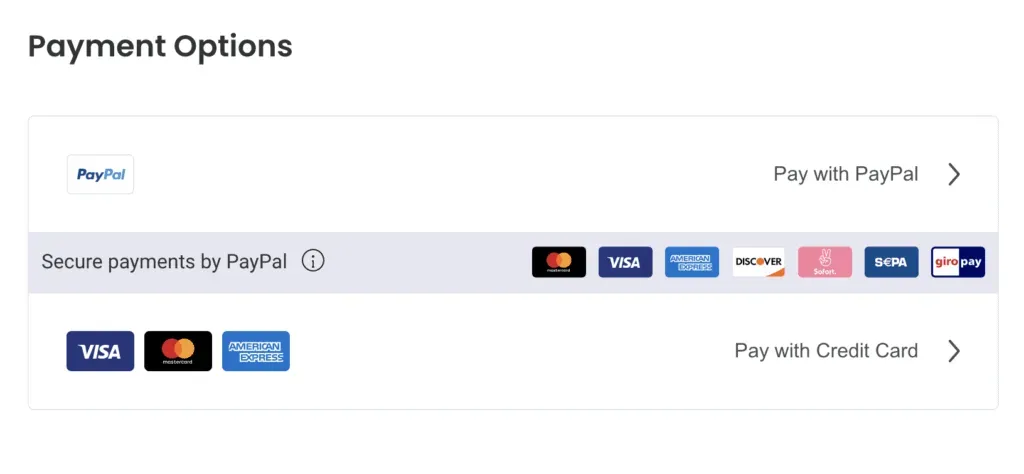
Even the shipping side also lacks many features that modern merchants expect, such as automatic shipping rules, personalized checkout flow, or real-time carrier rates. Therefore, its eCommerce system is best suited for smaller stores with straightforward needs rather than businesses aiming for long-term growth.
Wix's eCommerce features
Wix, on the other hand, offers a much more comprehensive environment for online selling.
At the center of this system is the Products panel, which acts as a command hub where you can view, edit, and organize all your products (hidden, published, or scheduled) using detailed filters like price, SKU, or stock levels. Bulk inventory management is also supported, meaning you can update multiple products at once either via CSV upload or directly in the panel. Needless to say, that is a major time-saver for stores with large catalogs!
Another standout is Wix's support for pre-orders: it integrates pre-order items directly into its inventory tracking system and displays them as negative stock levels (for example, –20). That way, merchants can calculate exactly how many products to restock and when to prevent overselling issues while keeping operations smooth.
On the payments front, Wix is also very robust, supporting over 80 payment gateways worldwide (not to mention its own in-house solution, Wix Payments, which bundles payment methods into a single system).
And when it comes to shipping, the platform provides six different configuration methods and even lets you differentiate rates between domestic and international customers with ease. As you can see, such a level of flexibility ensures that your store can scale more smoothly than with Jimdo as your customer base expands globally.
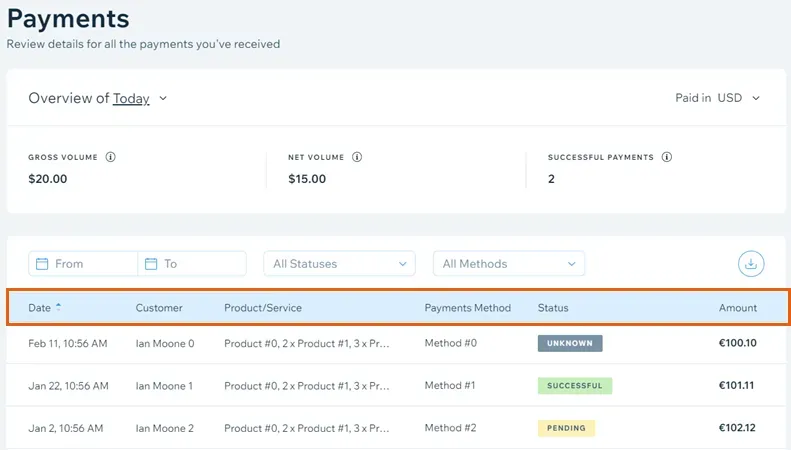
SEO & Marketing (Wix wins)
The Verdict:
Both Jimdo vs Wix provide only the basics when it comes to SEO. However, when we look at marketing tools, Wix pulls far ahead with a much richer set of features to help merchants attract, engage, and retain customers.
Given the overall philosophy of each platform, this Jimdo vs Wix difference makes sense. Let's break it down further!
Jimdo's SEO & marketing
In terms of SEO, Jimdo chooses to offer a built-in tool that guides you step by step through a checklist. Tasks included in the checklist cover mostly the very basics, such as adding relevant keywords, writing meta descriptions, and ensuring that your page structure uses headings appropriately. And as you complete each item, the system marks it off; that way, even small business owners can get the fundamentals right.
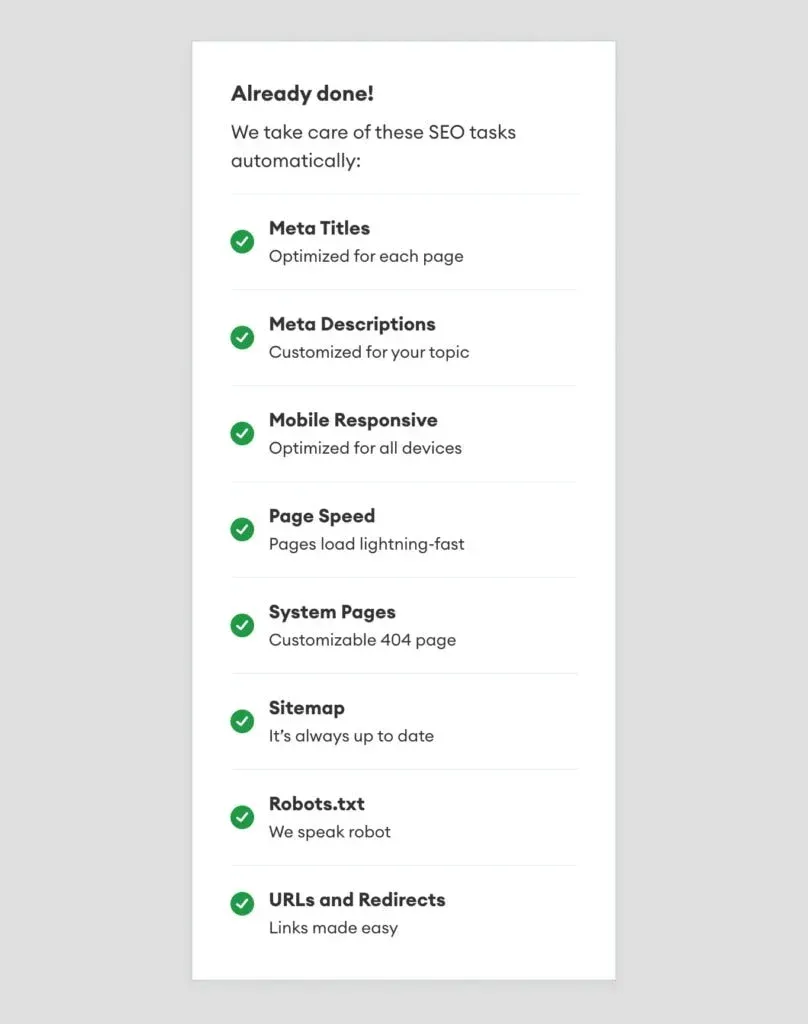
Unfortunately, the downside becomes apparent once the checklist ends, since advanced features are nowhere to be found. For that reason, Jimdo is more appropriate for casual users who simply want their site to be “SEO-friendly enough,” rather than those aiming to aggressively compete for top rankings.
On the marketing front, Jimdo also keeps things similarly basic. Its primary feature is the discount code system, where you can create promotions simply by setting the discount amount and applying conditions (e.g., a minimum order value).
Sure, this tool is undeniably useful for running short-term campaigns or rewarding repeat customers with special offers. Still, we must say that the overall toolkit is thin: there's no built-in way to create newsletters, control marketing flows, manage mailing lists, and the like. As a result, any business hoping to do more than the occasional sale will need to rely on third-party integrations or external software.
Wix's SEO & marketing
On the other hand, Wix takes a much broader marketing approach, as it equips store owners with tools that go beyond discounts and cover multiple aspects of customer engagement. Some of the most notable include:
Lead-capture forms: Easily embed customizable forms on your site to gather contact details for newsletters, event signups, or surveys, and manage leads directly within Wix.
- Google Ads integration: Promote your products across YouTube and Google Search with built-in ad campaign support.
- Customer accounts: Returning shoppers can create accounts that save their preferred shipping and payment information, streamlining the checkout process and encouraging repeat purchases.
- Automatic discounts and loyalty programs: Your team has the option to set up automatic discounts that apply at checkout to drive conversions. At the same time, loyalty programs allow stores to reward long-term customers with redeemable points.
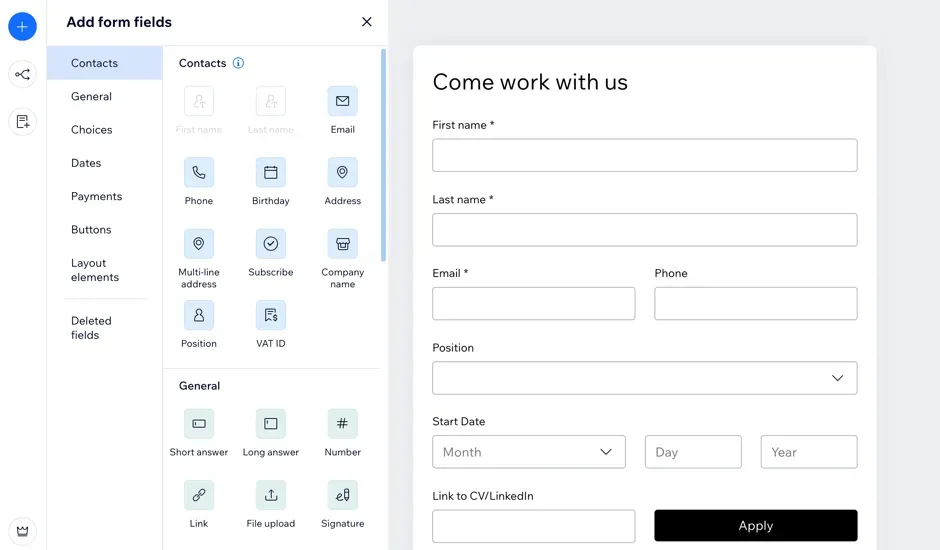
Needless to say, compared to Jimdo, these features make Wix far more capable of helping businesses not just build an online store, but also grow and sustain it through active marketing!
That said, Wix's SEO options remain fairly limited. The platform does provide a straightforward menu for editing tags, metas, URLs, and indexability settings, but that's about as far as it goes. There are no other advanced features at all – so just like Jimdo, Wix does fine for everyday SEO but is not the most sophisticated tool for those aiming to maximize their search engine performance.
Blogging (Wix wins)
The Verdict:
Wix is clearly the better choice for bloggers who want to grow their audience and manage a scalable blog alongside their store. Jimdo, on the other hand, does the job for those who simply want a lightweight blog as part of a small website.
Jimdo's limitations become more apparent as blogging assumes a larger role in your business, as seen in the Jimdo vs Wix comparison below:
Jimdo's blogging
Jimdo keeps blogging settings straightforward, which is part of its appeal.
Specifically, every plan comes with a built-in blog section, so you don't need to install apps or deal with extra configuration. Better yet, writing a post is also very intuitive: you can add text, images, or videos, assign titles and dates, categorize posts, write summaries, and tag them for easier navigation!
Regarding comment options, you can either use Jimdo's native system or integrate with third-party systems like Disqus. Plus, to encourage visibility, you may consider enabling social sharing buttons so readers can quickly spread your content.

Unfortunately, where Jimdo falls short is in flexibility and scalability. Sure, you can make basic design tweaks (e.g., adjusting layouts, fonts, or colors to match your site), but the options stop there.
One major problem is that the platform doesn't provide robust support for multiple authors, so managing a team of contributors can be extremely difficult. Worse, embedding posts outside the main blog section is limited, and the editor itself lacks advanced formatting tools that growing blogs often rely on. As a result, these drawbacks can feel like a major constraint as your content library expands over time.
Wix's blogging
On the other hand, Wix's blogging experience feels like a true extension of your store's growth potential.
By adding the Wix Blog app, you instantly get a feed page and dedicated post pages that you can tailor to your needs! Layout options are flexible, so feel free to tailor them to your preference, be it a clean list, an eye-catching grid, or a dynamic masonry view. You can also fine-tune how posts appear, choose what details to show (e.g., excerpts, images, tags, dates, etc.), and customize styling elements like fonts, colors, and spacing so the blog blends seamlessly with the rest of your site.

And there's still more: one of Wix's strongest advantages lies in collaboration and control. Unlike Jimdo, the platform allows multiple contributors, so it's much easier to manage a team of writers or editors. You can also schedule posts to go live at specific times, which is invaluable for planning campaigns or keeping a consistent publishing rhythm!
For monetization, Wix enables you to set up members-only subscriptions to turn certain posts into premium content. On top of that, detailed analytics provide insight into how readers are engaging with your blog, giving you data to refine your content strategy over time.
Apps & Integration (Wix wins)
The Verdict:
Between Jimdo vs Wix, Wix offers a much more wide-ranging ecosystem that allows you to expand your website with tools for marketing, sales, customer engagement, and beyond.
Jimdo, by comparison, feels very restricted, not just when held up against Wix but also against most modern website builders in the market. To see how wide this gap really is, let's look at what each platform brings to the table.
Jimdo's apps & integration
From our observation, Jimdo's app offering is modest and very much geared toward covering only the basics. Its main integrations are built around four POWr plugins:
- A Contact Form Builder that lets you add simple forms to your site
- A Hit Counter for tracking traffic
- A Popups and Sales tool for creating promotional windows or email capture boxes
- A Social Feed that pulls content from platforms like Instagram or Facebook.
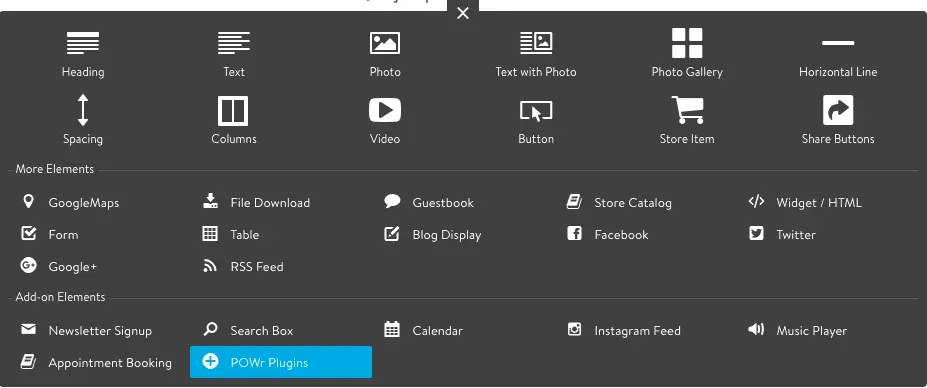
Of course, these still cover some essential use cases, including collecting inquiries, monitoring visitors, running small promotions, or embedding social media. Nevertheless, they clearly leave much to be desired for businesses seeking more advanced functionality.
Outside of these POWr plugins, Jimdo also recommends about 10 add-ons for text design and booking. Unfortunately, these extras don't change the fact that Jimdo's app ecosystem is still extremely limited in scope. As soon as you want to integrate more sophisticated solutions like advanced email marketing, CRM systems, or automated inventory syncing, the lack of options quickly becomes a roadblock!
Wix's apps & integration
By contrast, the Wix App Market houses over 800 apps covering nearly every category you can think of, from marketing and analytics to bookings, payments, customer support, and design enhancements. This library includes both Wix's own apps (such as Wix Stores for eCommerce or Wix Blog for content publishing) and third-party integrations that extend your site's functionality far beyond what comes out of the box.
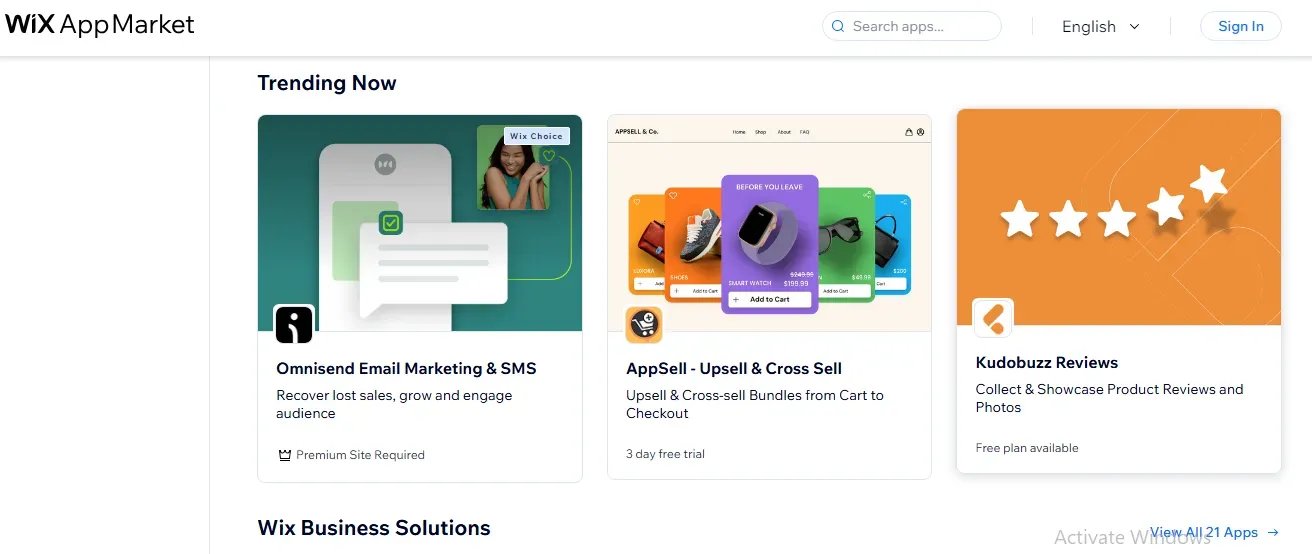
Most of these apps can be installed with just a click, and nearly all are mobile-optimized, meaning you don't have to worry about compatibility when your customers are browsing on different devices. Many of them are free, though others do follow a freemium model where core features are unlocked at no cost but advanced ones require payment (up to $300 per month).
Mobile Optimization (Wix wins)
The Verdict:
Both Jimdo vs Wix provide mobile-friendly interfaces and templates. However, with Jimdo, adjustments are still best handled from the desktop editor. Wix, on the other hand, gives you a dedicated Mobile Editor that makes it far easier to tweak key elements directly for mobile.
Want to know why Wix takes the lead in this criterion? Learn more about their strengths and weaknesses below:
Jimdo's mobile optimization
Jimdo uses responsive templates that automatically adjust to different screen sizes, no matter whether your visitors are browsing on a phone, tablet, or desktop. In “Jimdo Creator” mode, the mobile view is built in and cannot be disabled; it simply adapts the desktop design into a version that fits smaller screens. As a result, you will instantly have a mobile-ready site without needing to configure anything extra!
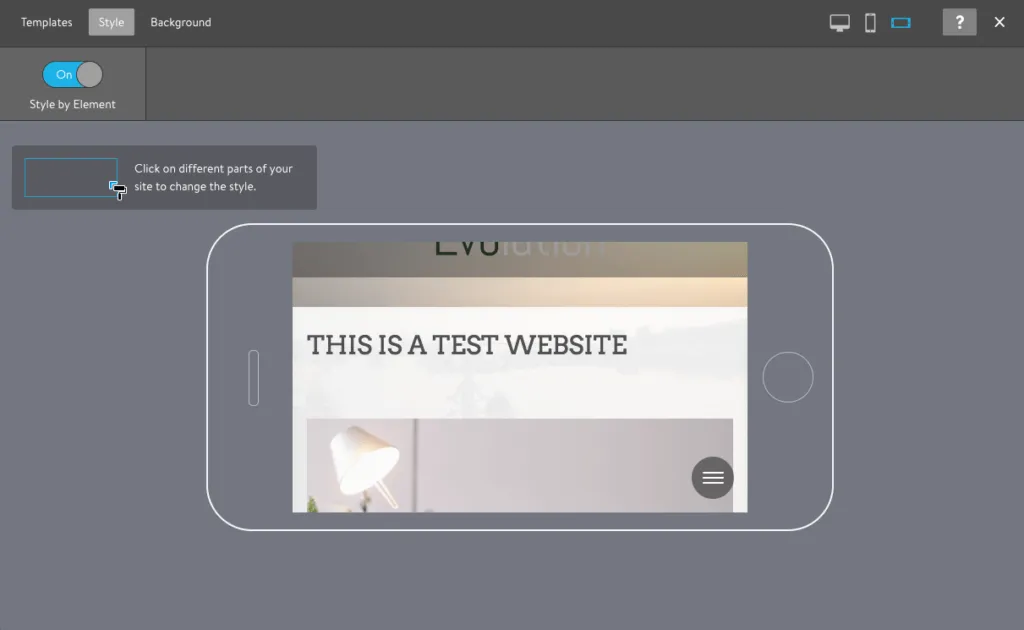
To help you visualize further how your website appears on smaller devices, Jimdo includes a preview toggle that lets you switch between monitor and mobile view. You can even check portrait and landscape orientations, which is quite useful if you want to see how design elements rearrange themselves.
The limitation, however, is in customization. If a heading appears oversized on a phone or an image overlaps awkwardly, Jimdo doesn't give you many granular tools to fix these issues directly in mobile view. Instead, you're generally expected to make changes from the desktop editor and hope they translate well to mobile.
Wix's mobile optimization
Just like Jimdo, every site built with the Wix Editor using Wix's themes automatically generates a mobile-friendly version.
But that's not all; the platform goes a step further by giving you a dedicated Mobile Editor. This tool allows you to preview and refine your site's mobile view independently from the desktop version, a level of control that Jimdo doesn't provide!
The advantages here are significant. With this Mobile Editor, you can:
- Hide or show specific elements exclusively on mobile
- Reorder or reposition sections so they feel natural on a small screen
- Adjust details like font size, padding, margins, or image dimensions to ensure everything is optimized for touch.

Wix also offers mobile-specific tools that enhance usability, including features like Quick Action bars, Back to Top buttons, and dedicated mobile menus. The only caveat is that if your desktop design is especially complex, you may still find yourself spending extra time manually adjusting the mobile view. Likewise, some overlapping or misaligned sections may still need hands-on fixes, preferably from the desktop.
Customer Support (Wix wins)
The Verdict:
When it comes to Jimdo vs Wix customer support, Wix offers a much more comprehensive system. Beyond the ability to reach real people through live chat or even phone support (albeit for an extra fee), Wix also invests heavily in documentation and tutorials that help users get the most out of the platform.
Jimdo, by comparison, keeps things simpler with a decent knowledge base and some contact options, but it lacks the immediacy and variety that Wix provides. Let’s explore how Jimdo vs Wix handle customer care in more detail.
Jimdo’s customer support
Jimdo leans heavily on its knowledge base, filled with detailed guides designed to help users solve common problems and learn how to configure basic platform settings. These resources are clear and practical, so we highly recommend them for beginners who want to troubleshoot issues independently.
How about situations that go beyond self-help? In those cases, Jimdo does provide several ways to get in touch with its team. Users can submit a help request directly through the Jimdo Help Support form, or reach out through social media channels like Instagram, YouTube, Facebook, X (formerly Twitter), and Pinterest.

That said, the platform has one major limitation: there is no phone or live chat support. Needless to say, this lack of real-time assistance can be frustrating: you’re often left waiting for an email response, which obviously does not feel adequate for businesses that rely on quick turnaround times.
Wix’s customer support
Regarding customer support, Wix offers both live chat and phone support in more than ten languages.
Availability does vary by language, but most services are offered from Monday (or Sunday) through Friday, which covers the majority of working hours globally. The only real drawback is that phone support requires an extra fee, but for many users, the ability to communicate directly with a support staff is already worth the cost!
Aside from direct contact, Wix has built a rich ecosystem of educational content. The Wix Knowledge Center is extensive, packed with tutorials and detailed guides covering everything from basic setup to advanced customization. Better yet, for those using Wix Studio, the platform even provides the Wix Studio Academy, an impressive library of short courses designed to help professionals sharpen their skills and take full advantage of the platform’s advanced features.

Pricing (Jimdo wins)
The Verdict:
When it comes to Jimdo vs Wix pricing, Jimdo is noticeably cheaper than Wix, which is a clear advantage for budget-conscious users.
That said, it’s important to recognize that lower pricing comes with trade-offs. Jimdo’s plans are lighter precisely because its overall feature set isn’t as comprehensive as Wix’s. Simply put, the “you get what you pay for” rule definitely applies here:
Jimdo’s pricing
Jimdo has separated its plans into two categories: personal websites and online stores. This distinction is quite practical as it allows users who just want a simple site to avoid paying for eCommerce tools they don’t need.
For personal websites, Jimdo offers four tiers:
- Free: $0
- Start (for personal use): $11/month
- Grow (for business websites): $18/month
- Unlimited (professional-grade designs): $45/month
On the eCommerce side, Jimdo provides three store-focused options:
- Basic (small shops): $18/month
- Business (more established stores): $22/month
- VIP (advanced toolbox for merchants): $45/month
Wix’s pricing
Similarly, Wix structures its pricing around a wider range of options, though its plans are more expensive overall.
For individuals, creators, and small to mid-sized businesses, Wix has four primary tiers:
- Light (the basics of website building): $17/month
- Core plan (more engagement tools): $29/month
- Business (growing brands): $39/month
- Business Elite (businesses ready to scale): $159 per month
And as mentioned earlier, Wix also provides a dedicated solution called Wix Studio for agencies, freelancers, and larger teams. This branch offers five subscription packages:
- Basic (building online brands): $12/month
- Standard (allowing users to accept payments): $20/month
- Plus (lead capture): $32/month
- Elite (scaling): $149/month
- Enterprise (organization with larger needs): Custom
Jimdo vs Wix: FAQs
Which is better, Wix or Jimdo?
For most use cases, Wix is the better platform since it offers more templates, deeper customization, stronger eCommerce features, and a far wider app marketplace. Jimdo is only preferable if your priority is to keep costs as low as possible and you don’t need advanced tools.
Is there a better website builder than Wix?
That depends on your needs. For all-in-one flexibility, Wix ranks among the top choices. However, platforms like Shopify may be better for pure eCommerce; meanwhile, Squarespace offers stronger design aesthetics for creative professionals.
What is the weakness of Wix?
Wix’s biggest weaknesses are its higher pricing and its relatively basic SEO capabilities. Though it does offer more marketing tools than Jimdo, its SEO options don’t go as deep as platforms like WordPress or Shopify. Additionally, highly complex desktop designs may need extra tweaking for mobile optimization.
Is Jimdo a good website builder?
Yes, Jimdo is good for beginners who want a simple, affordable way to get online. It’s especially suited for personal websites, portfolios, or very small online stores. However, for those who want advanced customization, robust eCommerce, or powerful marketing tools, Jimdo will feel limiting compared to Wix.
Final Verdict: When to Choose Jimdo vs Wix
All in all, Jimdo is best suited for those who want a low-cost website without needing advanced features, such as:
- Freelancers building a simple personal portfolio.
- Hobbyists who want a casual website or blog.
- Very small businesses like a local café or boutique.
- Small online shops with just a handful of products.
Wix, on the other hand, is the stronger choice for businesses aiming to grow or needing more flexibility, including:
- Expanding online stores that require advanced eCommerce features.
- Content-driven sites like blogs, online magazines, or communities.
- Agencies or freelancers managing multiple client projects.

